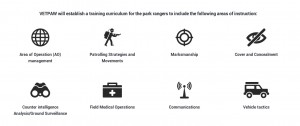Veterans Empowered to Protect African Wildlife (VETPAW) seeks to provide meaningful employment to post-9/11 U.S. veterans through conservation efforts in East African nations. They have chosen to continue their life of service.

Ryan Tate, a former U.S. Marine who enlisted on his 18th birthday after the September 11th terrorist attacks, started the organization as a way to employ veterans, while fighting poaching and promoting conservation. The group states that it “utilizes the unrivaled expertise of veterans to train and support African rangers and to provide sustainable solutions.” As poaching becomes increasing militarized, African nations have been trying to match firepower and training. As incidents like the storming of Bouba N’Djida national park by the Sudanese Janjaweed continue and unarmed park guards remain less than a match for the poachers, militarization appears necessary for the protection of animals and park guards alike.
According to their website, VETPAW “empowers African park rangers by training and implementing the skills that are vital to the success of anti-poaching efforts.” After VETPAW training, rangers are able to cover ground more efficiently and effectively. This has resulted in the determent and detainment of poachers in communities where VETPAW has done its training.
The organization focuses on: concealment, vehicle tactics, cover, marksmanship, communications, first aid, counter intelligence, movements, searches, and use of GPS equipment.
This curriculum empowers the rangers to be more effective, while giving purpose to veterans who have felt “lost” since their tours of duty ended, like the founder of VETPAW, Ryan Tate.
“When I returned to civilian life after the Marine Corp, I lost myself. I didn’t really know what I was here for. Learning about the brutality of the poaching crisis and the rangers who are dying protecting wildlife, hit me harder than anything I’d ever seen—and I’ve seen some crazy stuff. I realized I have the skills necessary to help save animals and the people who risk their lives daily” said Tate.
While some bloggers, like Bored Panda, have characterized the group as “poacher hunters,” VETPAW remains adamant that the organization is training based.
With focuses on teaching rangers to “not just trigger pull,” VETPAW is working to make rangers safer and smarter in the field. Something that can only help conservation, the elephants and even the veterans who train the rangers. Our nation’s veterans are continuing their life of service.
“The group gives me purpose again” says a member of VETPAW.




Leave a Reply